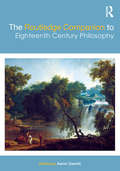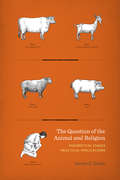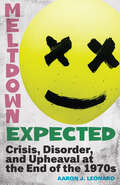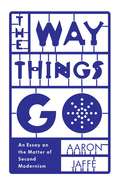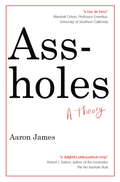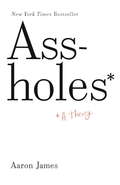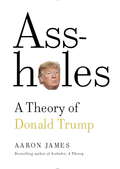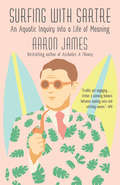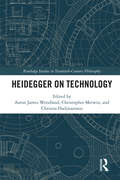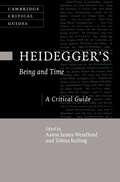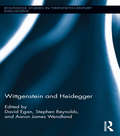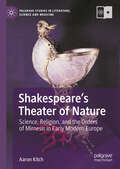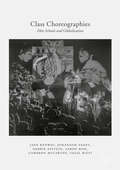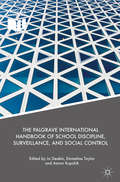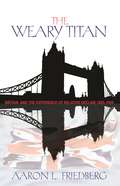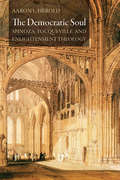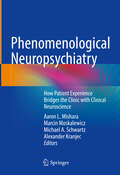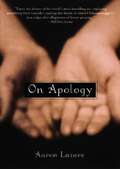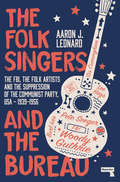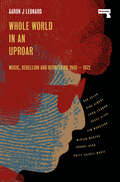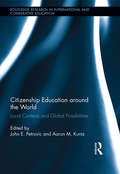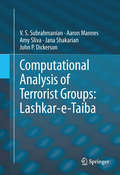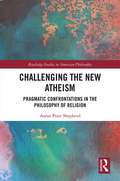- Table View
- List View
The Routledge Companion to Eighteenth Century Philosophy (Routledge Philosophy Companions)
by Aaron GarrettThe Eighteenth century is one of the most important periods in the history of Western philosophy, witnessing philosophical, scientific, and social and political change on a vast scale. In spite of this, there are few single volume overviews of the philosophy of the period as a whole. The Routledge Companion to Eighteenth Century Philosophy is an authoritative survey and assessment of this momentous period, covering major thinkers, topics and movements in Eighteenth century philosophy. Beginning with a substantial introduction by Aaron Garrett, the thirty-five specially commissioned chapters by an outstanding team of international contributors are organised into seven clear parts: Context and Movements Metaphysics and Understanding Mind, Soul, and Perception Morals and Aesthetics Politics and Society Philosophy in relation to the Arts and Sciences Major Figures. Major topics and themes are explored and discussed, ranging from materialism, free will and personal identity; to the emotions, the social contract, aesthetics, and the sciences, including mathematics and biology. The final section examines in more detail three figures central to the period: Hume, Rousseau and Kant. As such The Routledge Companion to Eighteenth Century Philosophy is essential reading for all students of the period, both in philosophy and related disciplines such as politics, literature, history and religious studies.
The Question of the Animal and Religion: Theoretical Stakes, Practical Implications
by Aaron GrossThrough an absorbing investigation into recent, high-profile scandals involving one of the largest kosher slaughterhouses in the world, located unexpectedly in Postville, Iowa, Aaron S. Gross makes a powerful case for elevating the category of the animal in the study of religion. Major theorists have almost without exception approached religion as a phenomenon that radically marks humans off from other animals, but Gross rejects this paradigm, instead matching religion more closely with the life sciences to better theorize human nature.Gross begins with a detailed account of the scandals at Agriprocessors and their significance for the American and international Jewish community. He argues that without a proper theorization of "animals and religion," we cannot fully understand religiously and ethically motivated diets and how and why the events at Agriprocessors took place. Subsequent chapters recognize the significance of animals to the study of religion in the work of Ernst Cassirer, Emile Durkheim, Mircea Eliade, Jonathan Z. Smith, and Jacques Derrida and the value of indigenous peoples' understanding of animals to the study of religion in our daily lives. Gross concludes by extending the Agribusiness scandal to the activities at slaughterhouses of all kinds, calling attention to the religiosity informing the regulation of "secular" slaughterhouses and its implications for our relationship with and self-imagination through animals.
Meltdown Expected: Crisis, Disorder, and Upheaval at the end of the 1970s
by Aaron J. LeonardIn January 1978, President Jimmy Carter proclaimed that “There is all across our land a growing sense of peace and a sense of common purpose.” Yet in the ensuing months, a series of crises disturbed that fragile sense of peace, ultimately setting the stage for Reagan’s decisive victory in 1980 and ushering in the final phase of the Cold War. Meltdown Expected tells the story of the power shifts from late 1978 through 1979 whose repercussions are still being felt. Iran’s revolution led to a hostage crisis while neighbouring Afghanistan became the site of a proxy war between the USSR and the US, who supplied aid to Islamic mujahideen fighters that would later form the Taliban. Meanwhile, as tragedies like the Jonestown mass suicide and the assassination of Harvey Milk captured the nation’s attention, the government quietly reasserted and expanded the FBI’s intelligence powers. Drawing from recently declassified government documents and covering everything from Three Mile Island to the rise of punk rock, Aaron J. Leonard paints a vivid portrait of a tumultuous yet pivotal time in American history.
The Way Things Go: An Essay on the Matter of Second Modernism
by Aaron JaffeBuffed up to a metallic shine; loose fitting, lopsided, or kludgy; getting in the way or getting lost; collapsing in an explosion of dust caught on the warehouse CCTV. Modern things are going their own ways, and this book attempts to follow them. A course of thought about their comings and goings and cascading side effects, The Way Things Go offers a thesis demonstrated via a century-long countdown of stuff. Modernist critical theory and aesthetic method, it argues, are bound up with the inhuman fate of things as novelty becoming waste. Things are seldom at rest. Far more often they are going their own ways, entering and exiting our zones of attention, interest, and affection. Aaron Jaffe is concerned less with a humanist story of such things—offering anthropomorphizing narratives about recouping the items we use—as he is with the seemingly inscrutable, inhuman capacities of things for coarticulation and coherence. He examines the tension between this inscrutability on the one hand, and the ways things seem ready-made for understanding on the other hand, by means of exposition, thing-and-word-play, conceptual art, essayism, autopoesis, and prop comedy.Among other novelties and detritus, The Way Things Go delves into books, can openers, roller skates, fat, felt, soap, joy buzzers, hobbyhorses, felt erasers, sleds, magic rabbits, and urinals. But it stands apart from the recent flood of thing-talk, rebuking the romantic tendencies caught up in the pathetic nature of debris defining the conversation. Jaffe demonstrates that literary criticism is the one mode of analysis that can unpack the many things that, at first glance, seem so nonliterary.
Assholes: A Theory
by Aaron JamesWhat does it mean for someone to be an a**hole? The answer is not obvious, despite the fact that we are often personally stuck dealing with people for whom there is no better name. Try as we might to avoid them, a**holes are found everywhere at work, at home, on the road, and in the public sphere. Encountering one causes great difficulty and personal strain, especially because we often cannot understand why exactly someone should be acting like that. A**hole management begins with a**hole understanding. In the spirit of the bestselling On Bullshit James gives us the concepts to think or say why a**holes disturb us so, and explains why such people seem part of the human social condition, especially in an age of raging narcissism and unbridled capitalism. These concepts are also practically useful, as understanding the a**hole we are stuck with helps us think constructively about how to handle problems they present. We get a better sense of when the a**hole is best resisted, and when he is best ignored a better sense of what is, and what is not, worth fighting for.
Assholes: A Theory
by Aaron JamesIn the spirit of the mega-selling On Bullshit, philosopher Aaron James presents a theory of the asshole that is both intellectually provocative and existentially necessary.What does it mean for someone to be an asshole? The answer is not obvious, despite the fact that we are often personally stuck dealing with people for whom there is no better name. Try as we might to avoid them, assholes are found everywhere—at work, at home, on the road, and in the public sphere. Encountering one causes great difficulty and personal strain, especially because we often cannot understand why exactly someone should be acting like that.Asshole management begins with asshole understanding. Much as Machiavelli illuminated political strategy for princes, this book finally gives us the concepts to think or say why assholes disturb us so, and explains why such people seem part of the human social condition, especially in an age of raging narcissism and unbridled capitalism. These concepts are also practically useful, as understanding the asshole we are stuck with helps us think constructively about how to handle problems he (and they are mostly all men) presents. We get a better sense of when the asshole is best resisted, and when he is best ignored—a better sense of what is, and what is not, worth fighting for.
Assholes: A Theory of Donald Trump
by Aaron JamesThat Donald Trump is an asshole is a fact widely agreed upon--even by his supporters, who actually like that about him. But his startling political rise makes the question of just what sort of asshole he is, and how his assholedom may help to explain his success, one not just of philosophical interest but of almost existential urgency. Enter the philosopher Aaron James, author of the foundational text in the burgeoning field of Asshole Studies: the bestselling Assholes: A Theory. In this brisk and trenchant inquiry into the phenomenon that is Donald Trump, James places the man firmly in the typology of the asshole (takes every advantage, entrenched sense of entitlement, immune to criticism); considers whether, in the Hobbesian world we seem to inhabit, he might not somehow be a force for good--i.e., the Stronger Asshole; and offers a suggestion for how the bonds of our social contract, spectacularly broken by Trump's (and Ted Cruz's) disdain for democratic civility, might in time be repaired. You will never think about Donald Trump the same way after reading this book. And, like it or not, think about him we must.From the Hardcover edition.
Surfing with Sartre: An Aquatic Inquiry into a Life of Meaning
by Aaron JamesFrom the bestselling author of Assholes: A Theory, a book that—in the tradition of Shopclass as Soulcraft, Barbarian Days and Zen and the Art of Motorcycle Maintenance—uses the experience and the ethos of surfing to explore key concepts in philosophy. The existentialist philosopher Jean-Paul Sartre once declared "the ideal limit of aquatic sports . . . is waterskiing." The avid surfer and lavishly credentialed academic philosopher Aaron James vigorously disagrees, and in Surfing with Sartre he intends to expound the thinking surfer's view of the matter, in the process elucidating such philosophical categories as freedom, being, phenomenology, morality, epistemology, and even the emerging values of what he terms "leisure capitalism." In developing his unique surfer-philosophical worldview, he draws from his own experience of surfing and from surf culture and lingo, and includes many relevant details from the lives of the philosophers, from Aristotle to Wittgenstein, with whose thought he engages. In the process, he'll speak to readers in search of personal and social meaning in our current anxious moment, by way of doing real, authentic philosophy.
Heidegger on Technology (Routledge Studies in Twentieth-Century Philosophy)
by Christos Hadjioannou Aaron James Wendland Christopher MerwinThis collection offers the first comprehensive and definitive account of Martin Heidegger’s philosophy of technology. It does so through a detailed analysis of canonical texts and recently published primary sources on two crucial concepts in Heidegger’s later thought: Gelassenheit and Gestell. Gelassenheit, translated as ‘releasement’, and Gestell, often translated as ‘enframing’, stand as opposing ideas in Heidegger’s work whereby the meditative thinking of Gelassenheit counters the dangers of our technological framing of the world in Gestell. After opening with a scholarly overview of Heidegger’s philosophy of technology as a whole, this volume focuses on important Heideggerian critiques of science, technology, and modern industrialized society as well as Heidegger’s belief that transformations in our thought processes enable us to resist the restrictive domain of modern techno-scientific practice. Key themes discussed in this collection include: the history, development, and defining features of modern technology; the relationship between scientific theories and their technological instantiations; the nature of human agency and the essence of education in the age of technology; and the ethical, political, and environmental impact of our current techno-scientific customs. This volume also addresses the connection between Heidegger’s critique of technology and his involvement with the Nazis. Finally, and with contributions from a number of renowned Heidegger scholars, the original essays in this collection will be of great interest to students of Philosophy, Technology Studies, the History of Science, Critical Theory, Environmental Studies, Education, Sociology, and Political Theory.
Heidegger's Being and Time: A Critical Guide (Cambridge Critical Guides)
by Aaron James Wendland Tobias KeilingMartin Heidegger's Being and Time, published in 1927, is widely regarded as his most important work and it has had a profound influence on twentieth-century philosophy. This Critical Guide draws on recently translated and published primary sources as well as the latest developments in Heidegger scholarship to provide a series of in-depth studies of this influential text. Twelve newly-written essays examine the unity of Being and Time; the nature of human communication; truth as a catalyst of cultural transformation; feminist approaches to Being and Time; the essence of authenticity; curiosity as an epistemic vice; the nature of rationality; realism and idealism; the ontological difference; the origin of time; the possibility of death; and the failure of the Being and Time project. The volume will be particularly valuable to students and scholars interested in phenomenology, existentialism, hermeneutics, metaphysics, epistemology, feminism, and ethics.
Wittgenstein and Heidegger: Pathways And Provocations (Routledge Studies in Twentieth-Century Philosophy)
by Stephen Reynolds David Egan Aaron James WendlandLudwig Wittgenstein and Martin Heidegger are arguably the two most influential philosophers of the twentieth century. Their work not only reshaped the philosophical landscape, but also left its mark on other disciplines, including political science, theology, anthropology, ecology, mathematics, cultural studies, literary theory, and architecture. Both sought to challenge the assumptions governing the traditions they inherited, to question the very terms in which philosophy’s problems had been posed, and to open up new avenues of thought for thinkers of all stripes. And despite considerable differences in style and in the traditions they inherited, the similarities between Wittgenstein and Heidegger are striking. Comparative work of these thinkers has only increased in recent decades, but no collection has yet explored the various ways in which Wittgenstein and Heidegger can be drawn into dialogue. As such, these essays stage genuine dialogues, with aspects of Wittgenstein’s elucidations answering or problematizing aspects of Heidegger’s, and vice versa. The result is a broad-ranging collection of essays that provides a series of openings and provocations that will serve as a reference point for future work that draws on the writings of these two philosophers.
Shakespeare’s Theater of Nature: Science, Religion, and the Orders of Mimesis in Early Modern Europe (Palgrave Studies in Literature, Science and Medicine)
by Aaron KitchShakespeare’s Theater of Nature argues that Shakespeare combined art and nature in new ways while experimenting with relations between words, images, and objects as sources of knowledge and pleasure. Shakespeare’s re-centering of nature as a source of theatrical representation in a range of plays follows debates in natural philosophy and theology about how to understand divinity in and through the order of nature (ordo creationis). Early chapters analyze early modern reframing of nature by printed books of botany, cosmology, and history—as well Tudor interludes that center nature as a subject—while later chapters offer readings of eight plays by Shakespeare that draw on classical, medieval, and early modern debates in natural philosophy and theology to create new modes of dramatic mimesis.
Class Choreographies: Elite Schools and Globalization
by Debbie Epstein Jane Kenway Johannah Fahey Aaron Koh Fazal Rizvi Cameron McCarthyAwarded Best Book prize by CIES Globalization and Education SIGAwarded 2nd Prize in the Society of Educational Studies Annual Book PrizeElite schools have always been social choreographers par excellence. The world over, they put together highly dexterous performances as they stage and restage changing relations of ruling. They are adept at aligning their social choreographies to shifting historical conditions and cultural tastes. In multiple theatres, they now regularly rehearse the irregular art of being global. Elite schools around the world are positioned at the intersecting pinnacles of various scales, systems and regimes of social, cultural, political and economic power. They have much in common but are also diverse. They illustrate how various modalities of power are enjoyed and put to work and how educational and social inequalities are shaped and shifted. They, thus, speak to the social zeitgeist. This book dissects this intricate choreography.
The Palgrave International Handbook of School Discipline, Surveillance, and Social Control
by Aaron Kupchik Emmeline Taylor Jo DeakinTruly international in scope, this Handbook focuses on approaches to discipline, surveillance and social control from around the world, critically examining the strategies and practices schools employ to monitor students and control their behavior. Bringing together leading scholars from a range of disciplinary backgrounds, the chapters scrutinize, analyze and compare schools' practices across the globe, providing a critical review of existing evidence, debates and understandings, while looking forward to address emerging important questions and key policy issues. The chapters are divided into four sections. Part 1 offers accounts of international trends in school discipline, surveillance and punishment; Part 2 examines the merging of school strategies with criminal justice practices; Part 3 focuses on developments in school technological surveillance; and Part 4 concludes by discussing restorative and balanced approaches to school discipline and behavior management. As the first Handbook to draw together these multiple themes into one text, and the first international comparative collection on school discipline, surveillance and social control, it will appeal to scholars across a range of fields including sociology, education, criminology, critical security studies and psychology, providing a unique, timely, and indispensable resource for undergraduate educators and researchers.
The Weary Titan: Britain and the Experience of Relative Decline, 1895-1905
by Aaron L. FriedbergHow do statesmen become aware of unfavorable shifts in relative power, and how do they seek to respond to them? These are puzzles of considerable importance to theorists of international relations. As national decline has become an increasingly prominent theme in American political debate, these questions have also taken on an immediate, pressing significance. The Weary Titan is a penetrating study of a similar controversy in Britain at the turn of the twentieth century. Drawing on a wide variety of sources, Aaron Friedberg explains how England's rulers failed to understand and respond to the initial evidence of erosion in their country's industrial, financial, naval, and military power. The British example suggests that statesmen may be slow to recognize shifts in international position, in part because they rely heavily on simple but often distorting indicators of relative capabilities. In a new afterword, Friedberg examines current debates about whether America is in decline, arguing that American power will remain robust for some time to come.
The Democratic Soul: Spinoza, Tocqueville, and Enlightenment Theology
by Aaron L. HeroldIn The Democratic Soul, Aaron L. Herold argues that liberal democracy's current crisis—of extreme polarization, rising populism, and disillusionment with political institutions—must be understood as the culmination of a deeper dissatisfaction with the liberal Enlightenment. Major elements of both the Left and the Right now reject the Enlightenment's emphasis on rights as theoretically unfounded and morally undesirable and have sought to recover a contrasting politics of obligation. But this has re-opened questions about the relationship between politics and religion long thought settled.To address our situation, Herold examines the political thought of Spinoza and Tocqueville, two authors united in support of liberal democracy but with differing assessments of the Enlightenment. Through an original reading of Spinoza's Theologico-Political Treatise, Herold uncovers the theological foundation of liberal democracy: a comprehensive moral teaching rehabilitating human self-interest, denigrating "devotion" as a relic of "superstition," and cultivating a pride in living, acting, and thinking for oneself. In his political vision, Spinoza articulates our highest hopes for liberalism, for he is confident such an outlook will produce both intellectual flourishing and a paradoxical recovery of community.But Spinoza's project contains tensions which continue to trouble democracy today. As Herold shows via a new interpretation of Tocqueville's Democracy in America, the dissatisfactions now destabilizing democracy can be traced to the Enlightenment's failure to find a place for religious longings whose existence it largely denied. In particular, Tocqueville described a natural human desire for a kind of happiness found, at least partly, in self-sacrifice. Because modernity weakens religion precisely as it makes democracy stronger than liberalism, it permits this desire to find new and dangerous outlets. Tocqueville thus sought to design a "new political science" which could rectify this problem and which therefore remains indispensable today in recovering the moderation lacking in contemporary politics.
Phenomenological Neuropsychiatry: How Patient Experience Bridges the Clinic with Clinical Neuroscience
by Marcin Moskalewicz Michael A. Schwartz Aaron L. Mishara Alexander KranjecThis innovative book offers a multidimensional exploration of the epistemological foundations of psychiatry and its major disorders. By emphasizing the importance of phenomenology in unravelling the intricate interplay between basic categories of human experience and neurobiological processes, it advocates for a shift in both psychiatric research and clinical practice. Phenomenological Neuropsychiatry presents psychiatry as a hybrid discipline that synthesizes subjective mental experiences with objective neuroscientific findings and forms an integrative and interdisciplinary structure that provides a dialectical bridge between understanding, compassion, and explanation. The first section of the book presents the lived experience of psychosis and argues for a more inclusive approach to mental health issues. The second section examines the ways in which psychiatric knowledge is constructed and the unique challenges posed by combining understanding and explanation of mental disorders. Section three sheds light on how disruptions in bodily experiences, memory processes, and self-perception can contribute to the development and manifestation of psychiatric issues. The following section discusses disorders of mood and anxiety, including the phenomena of depression, obsessions, and depersonalization. The fifth and final section provides an in-depth examination of psychotic disorders. It covers a range of topics, such as timing, intentionality, self-monitoring of action in schizophrenia, and the neurobiology of prodromal psychosis. As a singular work dedicated to revitalizing and advancing cross-fertilization between psychiatry and phenomenology, this groundbreaking book clears the foggy operationalized clusters of mental symptoms that may obscure diagnosis and treatment and argues for systematic integration of patient subjectivity and collaboration in clinical research. It features an authorship of the leading clinicians and thinkers from throughout the world in psychiatry, psychology, neuroscience, social sciences, and philosophy. Phenomenological Neuropsychiatry: How Patient Experience Bridges the Clinic with Clinical Neuroscience is a major contribution to the clinical literature and a must-read for psychiatrists, neurologists, psychologists, and professionals and students from other disciplines concerned with absorbing a deeper understanding of psychiatric disorders.
On Apology
by Aaron LazareOne of the most profound interactions that can occur between people, apologies have the power to heal humiliations, free the mind from deep-seated guilt, remove the desire for vengeance, and ultimately restore broken relationships. With On Apology, Aaron Lazare offers an eye-opening analysisof this vital interaction, illuminating an often hidden corner of the human heart. He discusses the importance of shame, guilt, and humiliation, the initial reluctance to apologize, the simplicity of the act of apologizing, the spontaneous generosity and forgiveness on the part of the offended, the transfer of power and respect between two parties, and much more. Readers will notonly find a wealth of insight that they can apply to their own lives, but also a deeper understanding of national and international conflicts and how we might resolve them. The act of apologizing is quite simply immensely fulfilling. On Apology opens a window onto this common occurrence to reveal the feelings and actions at the heart of this profound interaction.
The Folk Singers and the Bureau: The FBI, the Folk Artists and the Suppression of the Communist Party, USA-1939-1956
by Aaron LeonardThe first book to document the efforts of the FBI against the most famous American folk singers of the mid-twentieth century, including Woody Guthrie, 'Sis Cunningham, Pete Seeger, Lee Hays and Burl Ives.Some of the most prominent folk singers of the twentieth century, including Woody Guthrie, 'Sis Cunningham, Pete Seeger, Lee Hays, Burl Ives, etc., were also political activists with various associations with the American Communist Party. As a consequence, the FBI, along with other governmental and right-wing organizations, were monitoring them, keeping meticulous files running many thousands of pages, and making (and carrying out) plans to purge them from the cultural realm.In The Folk Singers and the Bureau, Aaron J Leonard draws on an unprecedented array of declassified documents and never before released files to shed light on the interplay between left-wing folk artists and their relationship with the American Communist Party, and how it put them in the US government's repressive cross hairs.At a time of increasing state surveillance and repression, The Folk Singers and the Bureau shows how the FBI and other governmental agencies have attempted to shape and repress American culture.
Whole World in an Uproar: Music, Rebellion and Repression – 1955-1972
by Aaron LeonardHow the radical music of the 1960s was birthed amid unprecedented upheaval and systemic repression.Seventy years since the radical music of the 1960s first hit the airwaves, the anthems of the era continue to resonate with our current times. Through studying these musicians and the political contexts in which their pioneering songs were birthed; amidst paranoia, psychedelic delusions, desire and civil unrest; Aaron Leonard&’s Whole World in an Uproar is an important new critical history of countercultural music from the Summer of Love to the unwelcome arrival of Bob Dylan.
Citizenship Education around the World: Local Contexts and Global Possibilities (Routledge Research in International and Comparative Education)
by John E. Petrovic Aaron M. KuntzThough certainly not a new idea, citizenship education manifests in unique and often unpredictable ways in our contemporary neoliberal era. The question of what it means to be a productive and recognized citizen must now be understood simultaneously along both global and local lines. This edited volume offers an international perspective on citizenship education enacted in specific socio-political contexts. Each chapter includes a pointed conceptualization of citizenship education—a philosophical framework—that is then applied to specific national cases across Europe, Asia, Canada and more. Chapters emphasize how such frameworks are implemented within local contexts, encouraging particular pedagogical/curricular practices even as they constrain others. Chapters conclude with suggestions for productive change and how educators might usefully engage contemporary contexts through citizenship education.
Computational Analysis of Terrorist Groups: Lashkar-e-taiba
by Amy Sliva V. S. Subrahmanian John P. Dickerson Jana Shakarian Aaron MannesComputational Analysis of Terrorist Groups: Lashkar-e-Taiba provides an in-depth look at Web intelligence, and how advanced mathematics and modern computing technology can influence the insights we have on terrorist groups. This book primarily focuses on one famous terrorist group known as Lashkar-e-Taiba (or LeT), and how it operates. After 10 years of counter Al Qaeda operations, LeT is considered by many in the counter-terrorism community to be an even greater threat to the US and world peace than Al Qaeda. Computational Analysis of Terrorist Groups: Lashkar-e-Taiba is the first book that demonstrates how to use modern computational analysis techniques including methods for "big data" analysis. This book presents how to quantify both the environment in which LeT operate, and the actions it took over a 20-year period, and represent it as a relational database table. This table is then mined using sophisticated data mining algorithms in order to gain detailed, mathematical, computational and statistical insights into LeT and its operations. This book also provides a detailed history of Lashkar-e-Taiba based on extensive analysis conducted by using open source information and public statements. Each chapter includes a case study, as well as a slide describing the key results which are available on the authors' web sites. Computational Analysis of Terrorist Groups: Lashkar-e-Taiba is designed for a professional market composed of government or military workers, researchers and computer scientists working in the web intelligence field. Advanced-level students in computer science will also find this valuable as a reference book.
The Art of Comics: A Philosophical Approach (New Directions in Aesthetics #32)
by Roy T. Cook Aaron MeskinThe Art of Comics is the first-ever collection of essays published in English devoted to the philosophical topics raised by comics and graphic novels. In an area of growing philosophical interest, this volume constitutes a great leap forward in the development of this fast expanding field, and makes a powerful contribution to the philosophy of art. The first-ever anthology to address the philosophical issues raised by the art of comics Provides an extensive and thorough introduction to the field, and to comics more generally Responds to the increasing philosophical interest in comic art Includes a preface by the renowned comics author Warren Ellis Many of the chapters are illustrated, and the book carries a stunning cover by the rising young comics star David Heatley
Religion and Identity in Porphyry of Tyre
by Aaron P. JohnsonPorphyry, a native of Phoenicia educated in Athens and Rome during the third century AD, was one of the most important Platonic philosophers of his age. In this book, Professor Johnson rejects the prevailing modern approach to his thought, which has posited an early stage dominated by 'Oriental' superstition and irrationality followed by a second rationalizing or Hellenizing phase consequent upon his move west and exposure to Neoplatonism. Based on a careful treatment of all the relevant remains of Porphyry's originally vast corpus (much of which now survives only in fragments), he argues for a complex unity of thought in terms of philosophical translation. The book explores this philosopher's critical engagement with the processes of Hellenism in late antiquity. It provides the first comprehensive examination of all the strands of Porphyry's thought that lie at the intersection of religion, theology, ethnicity and culture.
Challenging the New Atheism: Pragmatic Confrontations in the Philosophy of Religion (Routledge Studies in American Philosophy)
by Aaron Pratt ShepherdThis book presents a pragmatic response to arguments against religion made by the New Atheism movement. The author argues that analytic and empirical philosophies of religion—the mainstream approaches in contemporary philosophy of religion—are methodologically unequipped to address the “Threefold Challenge” made by popular New Atheist thinkers such as Richard Dawkins, Sam Harris, Christopher Hitchens, and Daniel Dennett. The book has three primary motivations. First, it provides an interpretation of the New Atheist movement that treats their claims as philosophical arguments and not just rhetorical exercises or demagoguery. Second, it assesses and responds to these claims by elaborating four distinct contemporary philosophical perspectives— analytic philosophy, empirical philosophy, continental philosophy, and pragmatism—as well as contextualizing these perspectives in the history of the philosophy of religion. Finally, the book offers a metaphilosophical critique, returning again and again to the question of method. In the end, the author settles upon a modified version of pragmatism that he concludes is best suited for articulating the terms and stakes of the God Debate. Challenging the New Atheism will be of interest to scholars and students of American philosophy and philosophy of religion.
